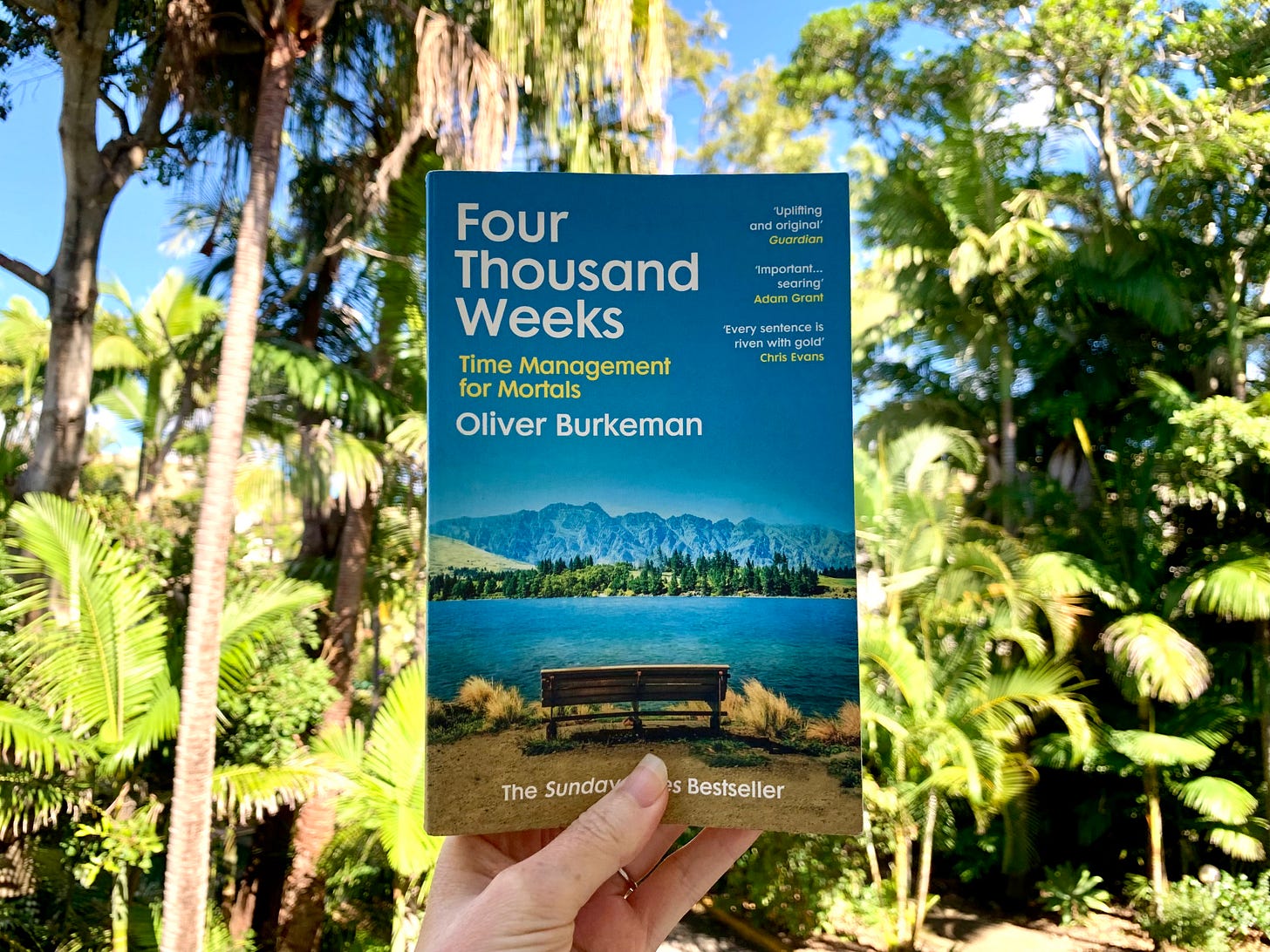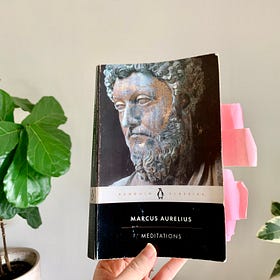15 Incredible Lessons From Four Thousand Weeks: Book Summary
In favor of less productivity and more meaning.
While we’d all like to believe that we’ll live forever, the reality is that the human life span is brief – more brief than many of us realize.
If you live to be eighty, you’ll live just four thousand weeks. Given this, Oliver Burkeman is suspicious of typical productivity books. We simply can’t do it all and trying to cram in more tasks and to-do lists is actually just distracting us from the reality that we don’t want to think about: We have limited time.
Burkeman helps us to consider how we can spend those four thousand weeks in meaningful ways that can actually bring about contentment.
As the author writes:
“Four Thousand Weeks is yet another book about making the best use of time. But it is written in the belief that time management as we know it has failed miserably, and that we need to stop pretending otherwise.”
These are some of my core lessons from the book.
1. Productivity could be distracting you
“The world is bursting with wonder, and yet it’s the rare productivity guru who seems to have considered the possibility that the ultimate point of all our frenetic doing might be to experience more of that wonder.”
The world has become obsessed with productivity hacks. While I’ve personally found a lot of value in being more productive (I was able to quit my job and start my own gig, for example), I can see a major issue with productivity books that don’t take into account what we’re doing more for.
Are we getting so distracted with doing, that we’re not really living? Burkeman certainly thinks so.
2. We’re skipping the important things in favor of busyness
“But now we get to the heart of things, to a feeling that goes deeper, and that’s harder to put into words: the sense that despite all this activity, even the relatively privileged among us rarely get round to doing the right things.”
It appears that many of us are on the hamster wheel without actually knowing why and what for. We’re getting busier, but that busyness has no aim.
Despite being busy, it seems that we’re not necessarily doing what’s important. Busyness has become such a habit so much so that many people are terrified of slowing down. If you can’t sit quietly in a room for ten minutes without a distraction (your phone, computer, Netflix etc), chances are you’re hooked on busyness.
3. Doing more isn’t the goal
“The day will never arrive when you finally have everything under control – when the flood of emails has been contained; when your to-do lists have stopped getting longer; when you’re meeting all your obligations at work in your home life; when nobody’s angry with you for missing a deadline or dropping the ball; and when the fully optimized person you’ve become can turn, at long last, to the things life is really supposed to be about.”
For Burkeman, the goal isn’t doing more. Instead, he asks us to accept that that’s simply never going to happen. We’ll never get on top of our busyness while we try to do everything in a life that’s actually quite short.
Arriving at this realization helps us to avoid trying to do it all. That allows us to start prioritizing what we care about and the things we truly want to achieve and experience in this lifetime.
4. We are burdened by time, yet equally ignoring it
“Once time is a resource to be used, you start to feel pressure, whether from external forces or from yourself, to use it well, and to berate yourself when you feel you’ve wasted it.”
We find ourselves in a perpetual state of running away from time, trying to get more of it, trying to constantly do more. And we feel as though we need to fill every second with something productive.
Time in this way can become a burden if it isn’t embraced for what it is.
5. You may feel as though you need to control time
“Soon your self-worth gets completely bound up with how you’re using time: it stops being merely the water in which you swim and turns into something you feel you need to dominate or control, if you’re to avoid feeling guilty, panicked or overwhelmed.”
It appears our perception of time is off. We haven’t quite mastered the art of just being rather than having to do all the time. But trying to catch time is futile. It’s not something to be caught, it’s simply the water in which we swim.
6. Busyness could be a distraction from important questions
“…my productivity obsession was serving a hidden emotional agenda… it also held at bay certain scary questions about what I was doing with my life…”
To come to his conclusions, the author became obsessed with trying various productivity techniques as an attempt to get control of his life and get more done, only to wind up more anxious and stressed.
He then realized that this productivity was getting in the way of important life questions and serving more as a distraction than a helpful tool.
As Burkeman writes,
“We recoil from the notion that this is it – that this life, with all its flaws and inescapable vulnerabilities, its extreme brevity, and our limited influence over how it unfolds, is the only one we’ll get a shot at.”
7. The time we have is astonishingly brief
“…if you can hold your attention, however briefly or occasionally, on the sheer astonishingness of being, and on what a small amount of that being you get – you may experience a palpable shift in how it feels to be here, right now, alive in the flow of time.”
Recognizing that life is actually rather brief can help us undergo a radical shift. We might not stress quite so much about that work issue. Or about what they said, or shouldn’t have said. We might find ourselves taking time to notice nature, to see the beauty in the every day, and to appreciate the time we have.
8. All choices require trade-offs
“Since every real-world choice about how to live entails the loss of countless alternative ways of living, there’s no reason to procrastinate, or to resist making commitments, in the anxious hope that you might somehow be able to avoid those losses.”
Avoidance is futile and so is procrastination. Ultimately all choices will result in tradeoffs of some kind.
We simply cannot have it all. It’s not possible, for example, to live in a big bustling city while simultaneously having a quiet life by the beach. We ultimately have to make choices and accept those choices. Fortunately, acceptance can provide a lot of freedom.
9. Your life is attention
“Attention, on the other hand, just is life: your experience of being alive consists of nothing other than the sum of everything to which you pay attention. At the end of your life, looking back, whatever compelled your attention from moment to moment is simply what your life will have been.”
When you're distracted, you’re not making a choice about where you want to pay attention. And that’s important because where you pay attention is ultimately how you spend your life.
If you’re addicted to screens, driven by the next incoming email, or lost in regrets and worries, your attention is going to places that you’re not consciously choosing.
Where you put your attention is ultimately how you live your life.
10. The attention economy is distracting us from what matters
“So it’s not simply that our devices distract us from more important matters. It’s that they change how we’re defining ‘important matters’ in the first place.”
Burkeman highlights that devices are not just providing a distraction. It’s also important to notice that algorithms – be it news or social media - are encouraging us to focus on things that aren’t necessarily representative of reality – distorting our view of the world.
The question is: where do you want to put your focus? For most of us, attention is going to issues that we have no control over, on things that increase worry, and on comparison with people we don’t know.
Would you prefer to focus your life on the things that matter? Your family. Your hobbies. Positive News. Nature.
11. The challenge is, noticing you’re distracted
“The unsettling possibility is that if you’re convinced that none of this is a problem for you – that social media hasn’t turned you into an angrier, less empathetic, more anxious or more numbed out version of yourself – that might be because it has.”
The difficulty is that you’ve likely been slowly coerced to believe that you want to be distracted by these various platforms and digital services.
The reality is likely very different. We must continually ask ourselves how we want to spend our time and live our lives in line with that.
12. Focussing forces us to face our finitude
“When you try to focus on something you deem important, you’re forced to face your limits, an experience that feels especially uncomfortable precisely because the task at hand is one you value so much.”
Ever tried to finish an important personal project only to find that work, studies, and various other responsibilities got in the way?
Burkeman believes that we unconsciously avoid doing what we really care about because it actually forces us to face the reality that we have limited time. It’s easier to fall under the illusion that there’s always more time when we’re not facing up to the projects and activities we truly want to do.
13. You’ll never be liberated from humanness
“There is a very down-to-earth kind of liberation in grasping that there are certain truths about being a limited human from which you’ll never be liberated.”
In this lifetime you won’t be able to gain full control over everything, nor be able to conclusively predict the future, or fill every moment with excitement or distraction.
Instead, it’s better to accept and pay full attention to the here and now. This can provide a kind of liberation that resistance can never over.
In Burkeman’s words, “And the paradoxical reward for accepting reality’s constraints is that they no longer feel so constraining.”
14. No amount of planning can remove anxiety
“Really, no matter how far ahead you plan, you never get to relax in the certainty that everything’s going to go the way you’d like.”
It doesn’t matter how much you plan or try to control the future, ultimately there will always be things out of your control. Planning will not liberate us from this. Instead, acceptance of our limitations will.
15. Rest from doing is essential
“In order to fully inhabit the only life you ever get, you have to refrain from using every spare hour for personal growth. From this perspective, idleness isn’t merely forgivable; it’s practically an obligation.”
In a world that values hustle, doing more, and achievements, the idea of embracing rest and idleness can be foreign to us.
But rest is ultimately what helps us to see our lives for what they are, to appreciate the present moment, and to actually live.
Hi 👋, I’m Chloe.
I write here and on Medium about books, philosophy, meditation, and mindfulness.
Why "be better than your past self" is terrible advice
We live in a world that always wants more from us. Whether it’s crushing it online, nailing it with a side hustle, getting that promotion, or moving to a bigger house – we’re constantly driven to achieve more. The promise is that by doing more and being better than yesterday, we’ll eventually reach happiness.
19 life-changing Stoic lessons from Meditations by Marcus Aurelius
In a world obsessed with success, social status, achievement, and doing more, Stoic lessons can provide a much-needed reprieve. Unsurprisingly, we’re more stressed, overwhelmed, anxious, and depressed than ever before. Something the pandemic hasn’t helped.




